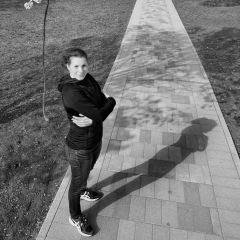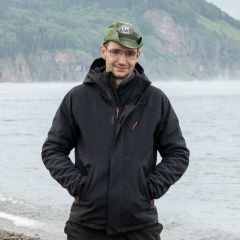Ко дню учителя.
У моих - новый набор Мастерской, уже 25-й. Вроде как, есть места, можно звонить.
Я её так давно проходила, как жизнь назад, хоть и продолжаю это обучение в рамках бессрочной второй ступени.
О чём это было, да и есть?
О том, что метафоры - это красиво, но всеми они понимаются по-разному. Хочешь быть понятым однозначно - обойдись без них.
О том, что говорить, как думаешь - необходимо, но думай всё же, что говоришь.
О том, что искренность ценна, а игры в общении напрягают.
О том, что, даже если ты должен, в силу профессии, относиться к людям без осуждения, ты не свободен от оценки их поступков, потому что это твоё человеческое, этическое - никуда не исчезает. И если ты говоришь, что не осуждаешь человека за что-то, потому что он клиент, но осудил бы его за это же, если бы он клиентом не был - ты врёшь себе, и, видимо, ему, а врать нехорошо.
О том, что конфронтация может быть продуктивна.
О том, что свою агрессию хорошо бы осознавать, потому что иначе с ней ничего не сделать, и что агрессия многолика.
О том, что ты можешь терпеть ради другого тоску, напряжение, раздражение, усталость. Ты не обязан, но можешь, если это нужно для помощи ему, и ты так решил.
И нет, ты при этом - не жертва. Это просто грань профессионализма. Такая же, как управление своей агрессией или осознание уязвимости. Такая же, как отклик на, может быть, едва заметный сигнал другого - оговорку, проблеск сразу высохшей слёзы.
О том, что слушая речь другого - надо слушать текст и смысл, а не цепляться за сниженную лексику и "тон". Этому можно уделить время потом, сначала-то услышь, о чем тебе говорят.
О том, что, если человек говорит о чем-то, для тебя бредовом, будь сначала с ним в этом бреду, иначе доверия не будет, да и не поймешь ничего.
О том, что доверие и открытость - то, без чего полноценного контакта нет и не предвидится.
О том, что помочь другому можно только в условиях хороших отношений с ним.
О том, что отношения меняют людей.
О том, что быть честным - нормально, а доброта - совсем не признак слабости.
И это не всё, конечно.
У них получается учить этому, потому что они сами это делают, понимают, могут. Потому что они профессиональные, да, само собой, но ещё добрые, умные и тёплые люди - А.И. Палей, И.А. Алексеева.
О них и об их Мастерской был и предыдущий пост, с более формальной информацией и с телефонами для связи.
У моих - новый набор Мастерской, уже 25-й. Вроде как, есть места, можно звонить.
Я её так давно проходила, как жизнь назад, хоть и продолжаю это обучение в рамках бессрочной второй ступени.
О чём это было, да и есть?
О том, что метафоры - это красиво, но всеми они понимаются по-разному. Хочешь быть понятым однозначно - обойдись без них.
О том, что говорить, как думаешь - необходимо, но думай всё же, что говоришь.
О том, что искренность ценна, а игры в общении напрягают.
О том, что, даже если ты должен, в силу профессии, относиться к людям без осуждения, ты не свободен от оценки их поступков, потому что это твоё человеческое, этическое - никуда не исчезает. И если ты говоришь, что не осуждаешь человека за что-то, потому что он клиент, но осудил бы его за это же, если бы он клиентом не был - ты врёшь себе, и, видимо, ему, а врать нехорошо.
О том, что конфронтация может быть продуктивна.
О том, что свою агрессию хорошо бы осознавать, потому что иначе с ней ничего не сделать, и что агрессия многолика.
О том, что ты можешь терпеть ради другого тоску, напряжение, раздражение, усталость. Ты не обязан, но можешь, если это нужно для помощи ему, и ты так решил.
И нет, ты при этом - не жертва. Это просто грань профессионализма. Такая же, как управление своей агрессией или осознание уязвимости. Такая же, как отклик на, может быть, едва заметный сигнал другого - оговорку, проблеск сразу высохшей слёзы.
О том, что слушая речь другого - надо слушать текст и смысл, а не цепляться за сниженную лексику и "тон". Этому можно уделить время потом, сначала-то услышь, о чем тебе говорят.
О том, что, если человек говорит о чем-то, для тебя бредовом, будь сначала с ним в этом бреду, иначе доверия не будет, да и не поймешь ничего.
О том, что доверие и открытость - то, без чего полноценного контакта нет и не предвидится.
О том, что помочь другому можно только в условиях хороших отношений с ним.
О том, что отношения меняют людей.
О том, что быть честным - нормально, а доброта - совсем не признак слабости.
И это не всё, конечно.
У них получается учить этому, потому что они сами это делают, понимают, могут. Потому что они профессиональные, да, само собой, но ещё добрые, умные и тёплые люди - А.И. Палей, И.А. Алексеева.
О них и об их Мастерской был и предыдущий пост, с более формальной информацией и с телефонами для связи.
To the day of the teacher.
Mine has a new set of Workshop, already the 25th. It seems like there are places, you can call.
I passed it for a long time, like a life back, although I continue this training within the framework of an indefinite second stage.
What was it and what is it?
The fact that metaphors are beautiful, but by all they are understood differently. You want to be understood unequivocally - go without them.
About what to say, what you think - is necessary, but think nevertheless what you say.
The fact that sincerity is valuable, but the games in communication are straining.
The fact that, even if you have to, by virtue of a profession, treat people without judgment, you are not free from assessing their actions, because it is your human, ethical one - it does not disappear anywhere. And if you say that you do not blame the person for something, because he is a client, but would condemn him for the same, if he was not a client - you lie to yourself, and, apparently, to him, but it is not good to lie.
The fact that confrontation can be productive.
The fact that his aggression would be well aware of, because otherwise it is impossible to do anything with it, and that aggression is many-sided.
The fact that you can tolerate for the sake of another longing, tension, irritation, fatigue. You do not have to, but you can, if you need it to help him, and you decided so.
And no, you are not a victim. This is just a face of professionalism. The same as managing your aggression or awareness of vulnerability. The same as the response to, perhaps, a barely noticeable signal from the other — a reservation, a glimpse of an instantly dried tear.
The fact that listening to the speech of another - it is necessary to listen to the text and meaning, and not to cling to the reduced vocabulary and tone. This can be given time later, first hear what they are saying to you.
The fact that if a person speaks about something delusional for you, be first with him in this delirium, otherwise there will be no trust, and you will not understand anything.
The fact that trust and openness is something without which there is no full-fledged contact and is not expected.
The fact that you can help others only in a good relationship with him.
The fact that relationships change people.
The fact that being honest is normal, and kindness is not at all a sign of weakness.
And that's not all, of course.
They succeed in teaching this, because they themselves do it, they understand, they can. Because they are professional, yes, of course, but still kind, intelligent and warm people - A.I. Paley, I.A. Alekseeva.
About them and their Workshop was the previous post, with more formal information and with phones for communication.
Mine has a new set of Workshop, already the 25th. It seems like there are places, you can call.
I passed it for a long time, like a life back, although I continue this training within the framework of an indefinite second stage.
What was it and what is it?
The fact that metaphors are beautiful, but by all they are understood differently. You want to be understood unequivocally - go without them.
About what to say, what you think - is necessary, but think nevertheless what you say.
The fact that sincerity is valuable, but the games in communication are straining.
The fact that, even if you have to, by virtue of a profession, treat people without judgment, you are not free from assessing their actions, because it is your human, ethical one - it does not disappear anywhere. And if you say that you do not blame the person for something, because he is a client, but would condemn him for the same, if he was not a client - you lie to yourself, and, apparently, to him, but it is not good to lie.
The fact that confrontation can be productive.
The fact that his aggression would be well aware of, because otherwise it is impossible to do anything with it, and that aggression is many-sided.
The fact that you can tolerate for the sake of another longing, tension, irritation, fatigue. You do not have to, but you can, if you need it to help him, and you decided so.
And no, you are not a victim. This is just a face of professionalism. The same as managing your aggression or awareness of vulnerability. The same as the response to, perhaps, a barely noticeable signal from the other — a reservation, a glimpse of an instantly dried tear.
The fact that listening to the speech of another - it is necessary to listen to the text and meaning, and not to cling to the reduced vocabulary and tone. This can be given time later, first hear what they are saying to you.
The fact that if a person speaks about something delusional for you, be first with him in this delirium, otherwise there will be no trust, and you will not understand anything.
The fact that trust and openness is something without which there is no full-fledged contact and is not expected.
The fact that you can help others only in a good relationship with him.
The fact that relationships change people.
The fact that being honest is normal, and kindness is not at all a sign of weakness.
And that's not all, of course.
They succeed in teaching this, because they themselves do it, they understand, they can. Because they are professional, yes, of course, but still kind, intelligent and warm people - A.I. Paley, I.A. Alekseeva.
About them and their Workshop was the previous post, with more formal information and with phones for communication.
У записи 16 лайков,
1 репостов,
1013 просмотров.
1 репостов,
1013 просмотров.
Эту запись оставил(а) на своей стене Ася Аксельрод





































